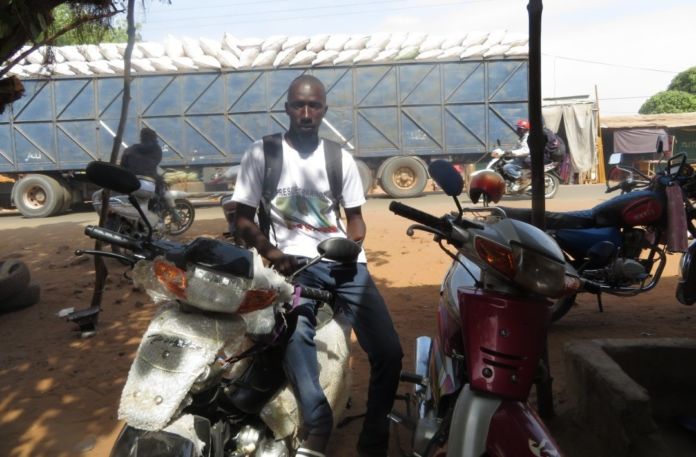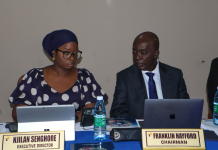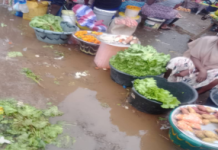By Kebba Secka
Commercial Motorcycle Transport In Farafenni Lucrative Source of Employment For Youth
The Urban town of Farafenni in the North Bank is booming with commercial motorcycle transport users after the urban town of Basse in the Upper River Region.
Commercial motorcycle use as taxi has developed lately as a means of transportation upcountry.
The town of Farafenni’s strategic location close to the border towns of Poste Kerr Ayib and Kerr Nderri in Senegal, has created trade opportunities for the citizenry for the smooth movement of goods in line with ECOWAS protocols within member states of the region and reason for the construction of the Senegambia bridge.
The business has attracted Gambian youth the majority of who are returnees from their perilous ‘backway’ journeys to Europe. As a result, ‘Tripoli’ garage which is one of the most famous garages of in Farafenni was established by migrant returnees.
Pedestrians who spoke to this medium welcome the services of these Motorcyclists and described the initiative as something that will ease mobility by making transportation accessible and affordable to the people, unlike other means of public transportation.
Alhagie Jallow and Fatou Ceesay who are both pedestrians, hailed commercial motorcycle transport as a solution to run their errands, at an affordable cost. The duo said they are frequent users of this alternative means of transport and have special clients they call whenever the need arises.
Oumie Jobe of Farafenni Mauritani was found negotiating the cost of transportation with one of the motorcyclists in the person of Fallou Sey. When asked about her opinion on this particular alternative means of transport, Oumie narrated similar experiences and benefits like previous users saying Farafenni has become a big town which is growing even further. She said the main market in Farafenni is now inaccessible to most residents and the commercial use of motorcycles as a means of transport facilitates their daily routine to and from the market; that before, they used to walk from afar to reach the market and used to be exhausted when they arrive home to cook. But this has been resolved by this alternative means of transport. Oumie said the youth who are engaged in the business await Government and regional authorities to empower them and make as it becomes their means of survival.
Malick Bittaye, the Public Relations Officer (PRO) of the Commercial Motorcycle Transport Association (CMTA), said the association was registered in 2018 and has an Executive body headed by Bai Secka as the president; that the Association’s aim amongst others is to unify their objectives as productive citizens of the country whose youths deserve to earn a decent living through hard work. Bittaye said the establishment of the association was necessitated because of Police disruption to their services with the frequent arrests of their members without any information of which Law they violated.
“We want the Police in Farafenni and any other person to see us as good citizens who choose to make a decent living. This business is profitable and if there is a peaceful environment, no youth in Farafenni will think of journeying through the ‘‘backway’’.he said.
Bittaye who is a migrant returnee from Libya, is also a member of the ‘Tripoli’ garage. He told this reporter that he graduated in 2015 and proceeded afterwards to the Gambia College’s School of Education, when he intended to become a qualified Primary School teacher; but that circumstances forced him to venture in the perilous journey before the completion of his program at the Gambia College; that having failed to succeed in his dream to reach what he calls greener pasture, PRO Bittaye said he returned home in 2016 and succeeded in the commercial motorcycle transportation business; that he has expanded his business and bought a taxi and other motorcycles to employ other people. He called on the Ministry of Youth and Ministry of Trade, Regional Integration and Employment, to reach out to them to facilitate and promote employment as part of Government’s efforts to create employment and stop the ‘‘backway’’ journey for youth.
Yusupha Gajaga, who is also engaged in the motorcycle transport trade, said the business has rewards as it makes differences in their lives. He however lamented the frequent Police harassments and arrests without any reasons advanced from them for the type of law they break.
“We need peace so that we can do our work. This is better for us than becoming thieves or to engage ourselves in petty crimes,” said Gajaga. He said he has never been a ‘‘backway’’ returnee, but has engaged in various occupations without much financial advancement compared to the commercial motorcycle transport he is currently engaged in.
This reporter visited two shops along the highway in Farafenni whose owners were commercial motorcyclists,but they declined to share their success stories.
When contacted to shed light on the alleged harassment and frequent arrest of the Police by the motorcyclists, the Chief of Operations of Farafenni Division M. I. Joof said the arrests are in relation to violations of traffic regulations by the motorcyclists.
‘‘They do not wear helmets and most of them do not have number plates,’’ he said. According to the Police Chief of Operations of Farafenni Division, the motorcycle taxi is not allowed under current Gambian Laws which is the reason why they arrest and subsequently prosecute the motorcyclists. He said they are usually prosecuted in line with the Motor Traffic Act and where they are found guilty, the fine may attract between two thousand dalasi to five thousand dalasi, depending on the offense. The Police Chief of Operations of Farafenni Division told this reporter that unless new regulations are included in the country’s Motor Traffic Laws, it will be difficult to regulate commercial motorcycle transportation. He urged the authorities to look into this and make the requisite Laws to ensure and enhance youth employability.




















